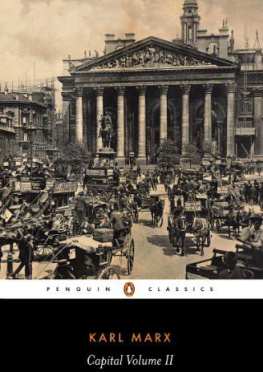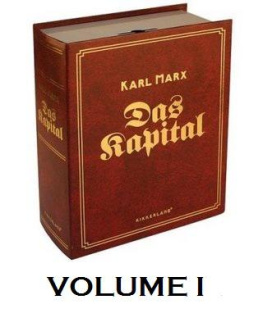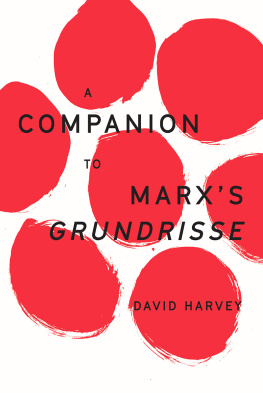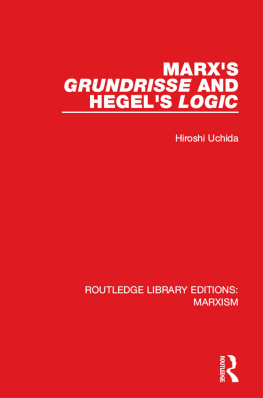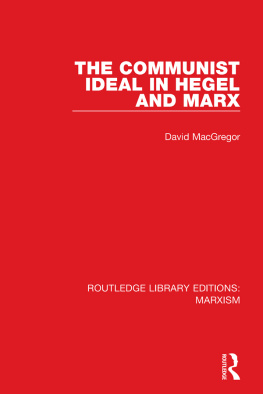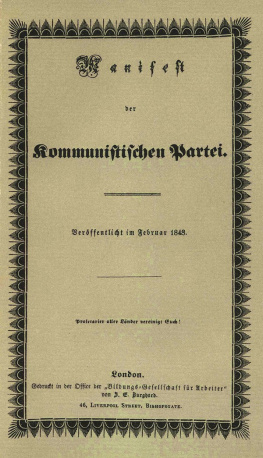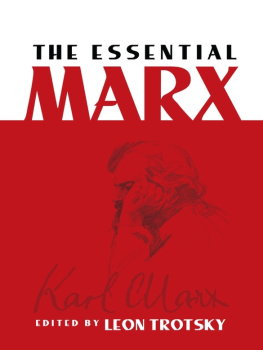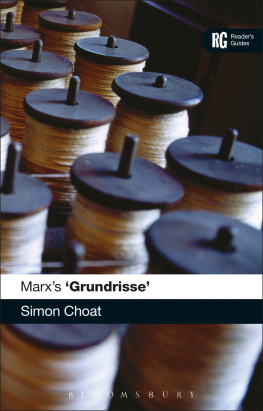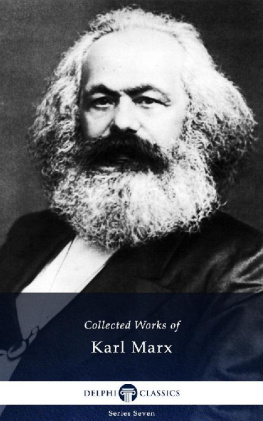
GRUNDRISSE
K ARL M ARX was born in Trier in 1818 of a German-Jewish family converted to Christianity. As a student in Bonn and Berlin he was influenced by Hegels dialectic, but he later reacted against idealist philosophy and began to develop his theory of historical materialism. He related the state of society to its economic foundations and mode of production, and recommended armed revolution on the part of the proletariat. In Paris in 1844 Marx met Friedrich Engels, with whom he formed a life-long partnership. Together they prepared the Manifesto of the Communist Party (1848) as a statement of the Communist Leagues policy. In 1848 Marx returned to Germany and took an active part in the unsuccessful democratic revolution. The following year he arrived in England as a refugee and lived in London until his death in 1883. Helped financially by Engels, Marx and his family nevertheless lived in great poverty. After years of research (mostly carried out in the British Museum), he published in 1867 the first volume of his great work, Capital. From 1864 to 1872 Marx played a leading role in the International Working Mens Association, and his last years saw the development of the first mass workers parties founded on avowedly Marxist principles. Besides the two posthumous volumes of Capital compiled by Engels, Karl Marxs other writings include The German Ideology, The Poverty of Philosophy, The Civil War in France, Grundrisse: Foundations of the Critique of Political Economy, The Revolutions of 1848, Surveys from Exile, The First International and After and Theories of Surplus-Value.
KARL MARX
Grundrisse
Foundations of the Critique of Political Economy (Rough Draft)
Translated with a Foreword by Martin Nicolaus
Penguin Books in association with New Left Review
PENGUIN BOOKS
Published by the Penguin Group
Penguin Books Ltd, 80 Strand, London WC2R 0RL , England
Penguin Putnam Inc., 375 Hudson Street, New York, New York 10014, USA
Penguin Books Australia Ltd, 250 Camberwell Road, Camberwell, Victoria 3124, Australia
Penguin Books Canada Ltd, 10 Alcorn Avenue, Toronto, Ontario, Canada, M4V 3B2
Penguin Books India (P) Ltd, 11 Community Centre, Panchsheel Park, New Delhi 110 017, India
Penguin Books (NZ) Ltd, Cnr Rosedale and Airborne Roads, Albany, Auckland, New Zealand
Penguin Books (South Africa) (Pty) Ltd, 24 Sturdee Avenue, Rosebank, 2196, South Africa
Penguin Books Ltd, Registered Offices: 80 Strand, London, WC2R 0RL , England
www.penguin.com
New Left Review, 7 Carlisle Street, London W1
Grundrisse der Kritik der Politischen konomie (Rohentwurf) first published 1939
This translation published in Pelican Books 1973
Reprinted in Penguin Books 1993
Translation and Foreword copyright Martin Nicolaus, 1973
Notes and Index copyright Ben Fowkes, 1973
Except in the United States of America, this book is sold subject to the condition that it shall not, by way of trade or otherwise, be lent, re-sold, hired out, or otherwise circulated without the publishers prior consent in any form of binding or cover other than that in which it is published and without a similar condition including this condition being imposed on the subsequent purchaser
ISBN: 978-0-14-119403-5
Foreword
This is a series of seven notebooks rough-drafted by Marx, chiefly for purposes of self-clarification, during the winter of 18578. The manuscript became lost in circumstances still unknown and was first effectively published, in the German original, in 1953. Among the many of Marxs works which first appeared in print in the twentieth century, the Grundrisse represents unquestionably the most significant new development, comparable in importance only to the Theories of Surplus Value and the Economic-Philosophical Manuscripts of 1844 (Paris Manuscripts). Marx considered these workbooks to contain the first scientific elaboration of the theoretical foundations of communism. Besides their great biographical and historical value, they add much new material, and stand as the only outline of Marxs full political-economic project. The manuscripts display the key elements in Marxs development and overthrow of the Hegelian philosophy. They cast a fresh light on the inner logic of Capital, and are a sourcebook of inestimable value for the study of Marxs method of inquiry. The Grundrisse challenges and puts to the test every serious interpretation of Marx yet conceived.
I
In Marxs life, the Grundrisse stands midway between the Manifesto of the Communist Party (1848) and the publication of the first volume of Capital in 1867. It was the onset of the economic crisis of 1857 which stimulated Marx to sum up and set on paper the economic studies of a decade and a half, but this was only the trigger. The force originated in the revolutions of 184850, or more precisely in the defeat of these revolutions.
In a series of insurrections and civil wars in virtually every nation-state, kingdom and principality of continental Europe, the spectre of communism, to which the Manifesto gave speech, made its first appearance as a cohesive body on the political stage, was everywhere bloodily crushed, and became a ghostly presence again, bottled up in fragile little magazines edited and read by refugees in foreign-speaking ghettoes of London and New York. As the clearest and most determined voices of the left wing of the democratic-radical forces, and as leading spokesmen of the most advanced workers organization, the League of Communists, Marx and Engels were notorious to the governments of Prussia, France and Belgium. Officially expelled and banished, with arrest warrants out for them, Marx and Engels moved to London and, for the first couple of years, like the whole German exile community, kept their coats on, awaiting the break that would signal a new revolution. As the forces of reaction began to settle in for a long reign, however, it was the exiles who broke first. After the defeat of the workers insurrection in Paris, in July 1850, Marx and Engels advanced the thesis that revolution had become impossible in the immediately foreseeable future, that a rapid return could not be counted on, and that the tasks of the League of Communists must be reset accordingly to give first priority to the work of education, study and development of revolutionary theory. It fell like cold water on the flames of exile fantasy. Although Marx and Engels won the Leagues London central committee over to their position by a slim majority and thus remained its de jure London representatives the great majority of the exiles stood against them, even the workers. I want at most twelve people in our circle, as few as possible, Marx stated, and, under taunts of being counter-revolutionaries, anti-proletarians and impractical literati taunts which they later repaid with compound interest Marx and Engels withdrew from organizational and practical There they remained for more than a decade. Throughout the period of reaction which fastened itself upon Europe in the 1850s, the German public heard next to nothing from Marx or Engels. The League dissolved in 1852.
It was Marxs second withdrawal from the political stage into his study. But while in the first period (18437) Marxs concerns had been various to learn to speak competently on questions of material interest, to become familiar with the French theories of socialism and communism, to battle a storm of doubts regarding the Hegelian philosophy now a single focus is apparent from the beginning. The defeat of this influence, next time, and the elevation of the working class to the position of leadership of the revolutionary camp as a whole, next time, was the overriding aim of Marxs studies.
Next page


